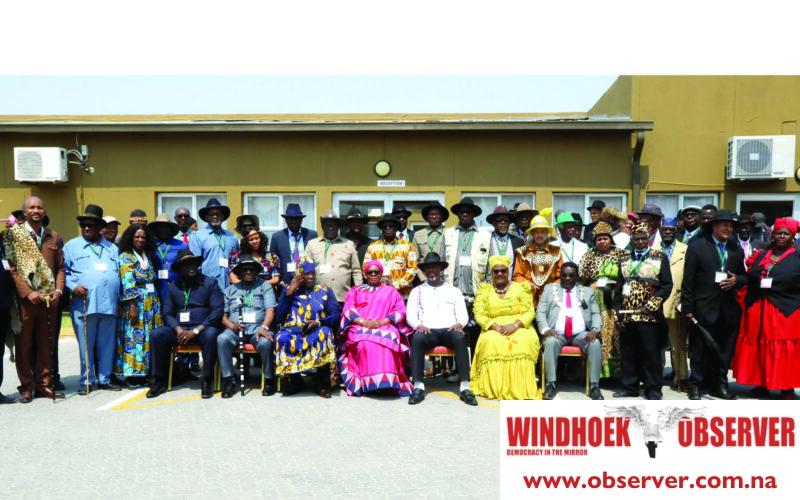Allexer Namundjembo
More than ten traditional authorities in the country remain without leadership due to succession disputes.
President Netumbo Nandi-Ndaitwah revealed this on Monday at the opening of the 26th annual meeting of the Council of Traditional Leaders at Ekamuti Guesthouse in Ondangwa.
The country has 53 recognised traditional authorities, but several are caught in long-running leadership battles.
Nandi-Ndaitwah warned that the disputes are undermining traditional governance and consuming resources meant for urgent priorities.
“As I am speaking to you now, out of 53 recognised Traditional Authorities, there are more than ten Traditional Authorities without leadership due to succession disputes,” she said.
She stressed that the conflicts are divisive and urged leaders to resolve them swiftly.
“Such conflicts are, by their nature, divisive. Therefore, I appeal to you to act swiftly and spare no effort in uniting your communities, because it is only through unity that we can collectively achieve the bold socio-developmental plans we have set for ourselves as a nation,” she said.
She expressed concerns that prolonged disputes were damaging the credibility of traditional institutions.
“I am burdened by the never-ending infighting and leadership succession disputes that continue to prevail in our communities across the country, to the extent that the integrity of our Traditional Authorities has come into question,” she said.
She cautioned that taking such matters to modern courts weakens traditional values.
“Forgoing the traditional solutions and taking these disputes to modern-day courts, which are based on a mixture of cultural practices, erodes the traditional values and norms in our society,” she said.
She urged leaders to respect customary laws and resolve disputes internally, adding that community courts were established to handle such matters under customary law.
Nandi-Ndaitwah also warned against the growing number of applications for new traditional authorities, questioning whether Namibia risks fragmenting into “pockets of tribal settlements”.
Her remarks come as succession disputes continue to trouble several communities. The Uukwangali Traditional Authority only resolved nearly a decade of uncertainty in August 2025 when Eugene Siwombe Kudumo was appointed chief, following the 2014 death of chief Daniel Sitentu Mpasi.
The Dâure Daman Traditional Authority is facing protests demanding the removal of chief Sagarias Seibeb over financial mismanagement claims. The Uukwambi Traditional Authority remains divided, with tensions spilling into a 2024 court case.
The Blouwes clan has struggled with disputes since 2012, while the Bondelswarts Traditional Authority has lacked a formally designated chief for 14 years after the death of captain Anna Katriena Christiaan.
Four months ago, newly appointed urban and rural development minister James Sankwasa was dragged to court less than two months into office after designating Gilbert Muhongo Mutwa as chief of the Masubia Traditional Authority.
The Masubia had been without a leader since the 2021 death of Kisco Maiba Liswani III. However, Trevor Chiswaniso Maiba, the late chief’s son, challenged Sankwasa’s decision in the High Court.
Losing credibility
At the same event, the chairperson of the Council of Traditional Leaders, Gaob Immanuel /Gaseb, warned that traditional authorities risk losing credibility if they allow self-interest and disputes to overshadow their responsibilities.
He reminded leaders that the late president Hage Geingob had called for succession disputes to end.
“It is our responsibility to resolve conflicts within communities, in accordance with customary laws,” he said.
He lamented that many disputes were driven by individuals seeking personal gain, not communities.
“We have many court cases and our traditional leaders are being summoned to appear before judges, but most of these are initiated by those who want to divide leaders and their communities for their own interests,” he said.
/Gaseb added that educated individuals often exploit divisions instead of helping strengthen traditional governance.
“As custodians of traditions, we must call up our sons and daughters to respect our customary norms… to strengthen good governance within our traditional authorities rather than sowing seeds of division,” he said.
He further warned that the council “will not continue to tolerate divisions,” stressing that unity is essential for traditional authorities to remain relevant.
Oshana Governor Hofni Alugodhi Iipinge welcomed delegates and described the gathering as a historic moment for the region.
The meeting brought together traditional leaders from across the country to deliberate on challenges facing their communities and their role in fostering unity, peace, and development.




